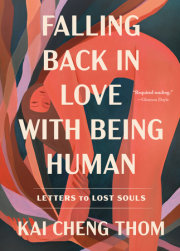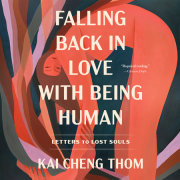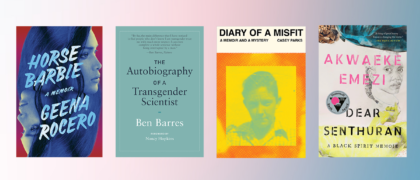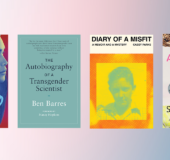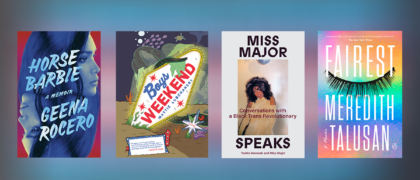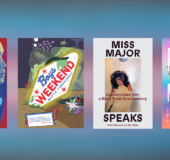to the ones whose bodies shall shake the heavens
after Sandy Stone
dear trans women: the only way to live as a being cast as irrevocably monstrous is to embrace a monster’s power. the power to inspire awe, horror, unbidden desire. a monster is a creature made of the truth no one else dares to speak. a monster is a being beyond fear. dear trans women: when they come bearing torches, remember that you are a being born of flame. and every moment you love yourself is a moment they can never take from you. dear trans women: we are the original witches. the reincarnations of the ones they burned. lesser outcasts will turn against you to save themselves; forgive them, for they know not what they do. never forget that a lineage of monstresses stands behind you, and stands proud. dear trans women: blessed are the hideous. blessed are the horrifying. blessed are the cursed. blessed are the unforgiven, the forgotten, the ones-who-must-not-be-loved. blessed are the mad, for our bodies shall shake the heavens.
Without looking at a dictionary, define the word monster.
to a lost sister
i stopped writing poems for a year after it happened. i didn’t believe in them anymore because they didn’t save your life. i’m not a praying woman, but poetry has always been my hotline to the universe. i guess that somewhere deep inside, i hoped that if i said something elegantly enough, it would come true. that if i spoke the language of beauty, maybe God would finally start listening. are you there, God? it’s me, f***ed-up transsexual with a savior complex. i’d like you to turn back time. if i could just go back once, i’m sure i could change the past for the better. did you know that the word abracadabra comes from a Hebrew phrase meaning “through speaking, i create”? i bet you do. my magic was never strong enough to manifest the miracles i wanted: to turn back time. to undo harm. to make the unspeakable things safe to say. to catch a spirit as it flies out of this world and weave it back into the body it left behind. what’s the use of writing poems if they can’t even do that? i wish i could talk to you. i’ve been wanting to tell you that complex PTSD and a crisis of faith have so much in common. they’re both about losing trust in the world in the wake of unbearable loss. grief tears us away from our faith, but it’s grief that brings us back as well. because in our deepest grief we have nowhere else to go. the Buddhist part of me knows that in the paradox, enlightenment is born. when you fell through a crack in the world and disappeared, i started meditating again. i lit candles every night. i tied a red rope around my waist before sleeping—anything to give my grief somewhere to go. for a year after it happened, i dreamed about getting lost in mazes and screaming without a voice, knowing that no one was coming to save me. but the Christian part of me knew that the secret of grace is choosing to believe. the secret of resilience is the art of surrender. i wish you were here. i’d tell you all the things i’ve learned about hope, and forgiveness, and holding on while letting go. our world keeps breaking, over and over again. i have no choice but to believe that a new one is being born.
Write a prayer of hope on a piece of paper and leave it somewhere for someone else to find.
to the ones who didn’t cry
when i first heard that the gunman had walked into three massage parlors in Atlanta and shot eight people dead, six of whom were Asian women, i did not cry. i went to bed and slept without dreaming, an instrument with its strings cut. it wasn’t until the morning after, as i watched the news, as i heard the white police officer say that the shooter was “fed up,” that he’d had “a really bad day,” that i felt my body break open and the words came pouring out like a rainstorm. like lava, like fire pouring out from deep within. tell me about the pain of a body that knows its life means nothing. i am learning more and more about what that means. i know i’m not alone in the least. i want to hear the stories of gun violence, police brutality, and racism. i want to know the truth even as it rips me apart like a land mine. for weeks after the shooting, whenever i tried to talk about it, i found myself weeping instead. i think the truth was choking me as it tried to find a way out of my throat. i want to tell you about the white man who used to pay me for massages. i want to tell you how he said he had a sex addiction, how he became obsessed with me, how i couldn’t tell anyone because they’d say it was my fault for choosing the job i did. when i saw the Asian advocacy groups talking about how it was wrong to assume that the victims of the shooting were sex workers, that it was insulting and degrading to Asian women, my body started screaming: why is my existence degrading to you? what do i remind you of? the news says we never got a confirmation about the kind of work those women did, and i think, why would you tell the truth when you know what people might do with it? Asian sisters and siblings, you can hate the plot of Miss Saigon without hating Miss Saigon. your body is not an invitation for violence. do you know, neither is mine. no body deserves to be silenced by bullets. no body deserves to be disposed of in the name of someone else’s shame. a body is skin wrapped around stories, is tissue filled with veins that the truth runs through, is a box of bones with a voice inside. i don’t want to be a volcano. i want to be a garden full of flowers bursting open toward life, all of them singing, i’m here. i mean something. i want to live.
Imagine a world in which all sex workers are considered sacred and holy, deserving of workers’ rights, health benefits, and compensation of their choosing. Draw or paint a picture of your vision. This might be a scene or person, or more abstract: a reflection of a feeling or energy.
Copyright © 2023 by Kai Cheng Thom. All rights reserved. No part of this excerpt may be reproduced or reprinted without permission in writing from the publisher.



